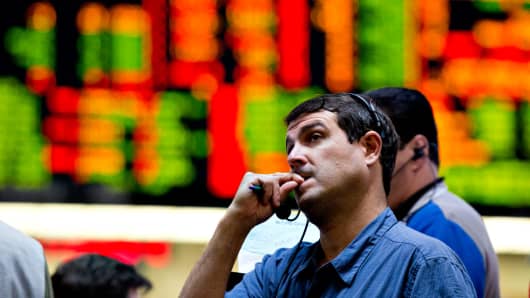The Federal Reserveis moving closer to announcing additional steps to stimulate the economy, but it can’t do much to curb the threat of another recession.
The economy is growing at less than 2 percent. Jobs creation in April, May and June was lower than a snake’s belly, averaging 75,000 a month or less than is necessary to keep up with population growth.
Unemployment holds steady at 8.2 percent only because so many folks have quit looking for work and are no longer counted in the official tally of joblessness.
Worker productivity is not advancing, indicating businesses have more employees than needed to meet demand, and layoffs will follow if sales don’t pick up. Jobless claims are up again, and would likely be worse but for the fact that many people have exhausted their eligibility.
Deteriorating conditions in Europe and a weaker euro and Chinese yuan indicate U.S. exporters and import-competing businesses will face a tough environment through the balance of the year.
Retail sales fell in April, May and June, as consumers became increasingly pessimistic that President Obama’s economic policies will fix the economy. And they are simply not convinced Governor Romney offers sufficiently effective alternatives and the personal qualities to be President.
Simply, Americans — even those with secure jobs — are hunkering down for a long siege. They are disgusted and frightened by corporate leaders and bankers who take outsized salaries while they mine the nation’s assets to invest abroad and gamble with government-insured money. All the while, they place the prosperity of ordinary Americans at grave risk to serve their avarice.
In manufacturing, the bright star of the recovery, new orders and shipments are growing haltingly. Many manufacturers and service businesses report falling prices. Prices being slashed to sustain sales is an ominous indicator of more layoffs and recession.
The Federal Reserve has already pulled all the levers that might make a difference. Short-term interest rates — such as the overnight bank borrowing rate and one-month and one- year Treasury Bill rates — are already close to zero.
When the Federal Reserve Open Market Committee met on June 19 and 20 more bond purchases to push down long-term Treasury and mortgage rates were already on the table. However, over the last several months, investors have moved cash from risky European government and corporate securities to U.S. bonds. The 30-year Treasury and mortgage rates are now near record lows, preempting the effectiveness of any additional Fed measures.
A statement that the Fed intends to keep short rates near zero beyond 2014 would have little impact on investor and home buyer psychology—already, few expect the Fed to push up interest rates in the foreseeable future.
Central bank policy can help dampen inflation when the economy overheats and lift borrowing and home salesa bit when it falters, but it can’t instigate faster growth when the President and Congress fail to address structural problems.



